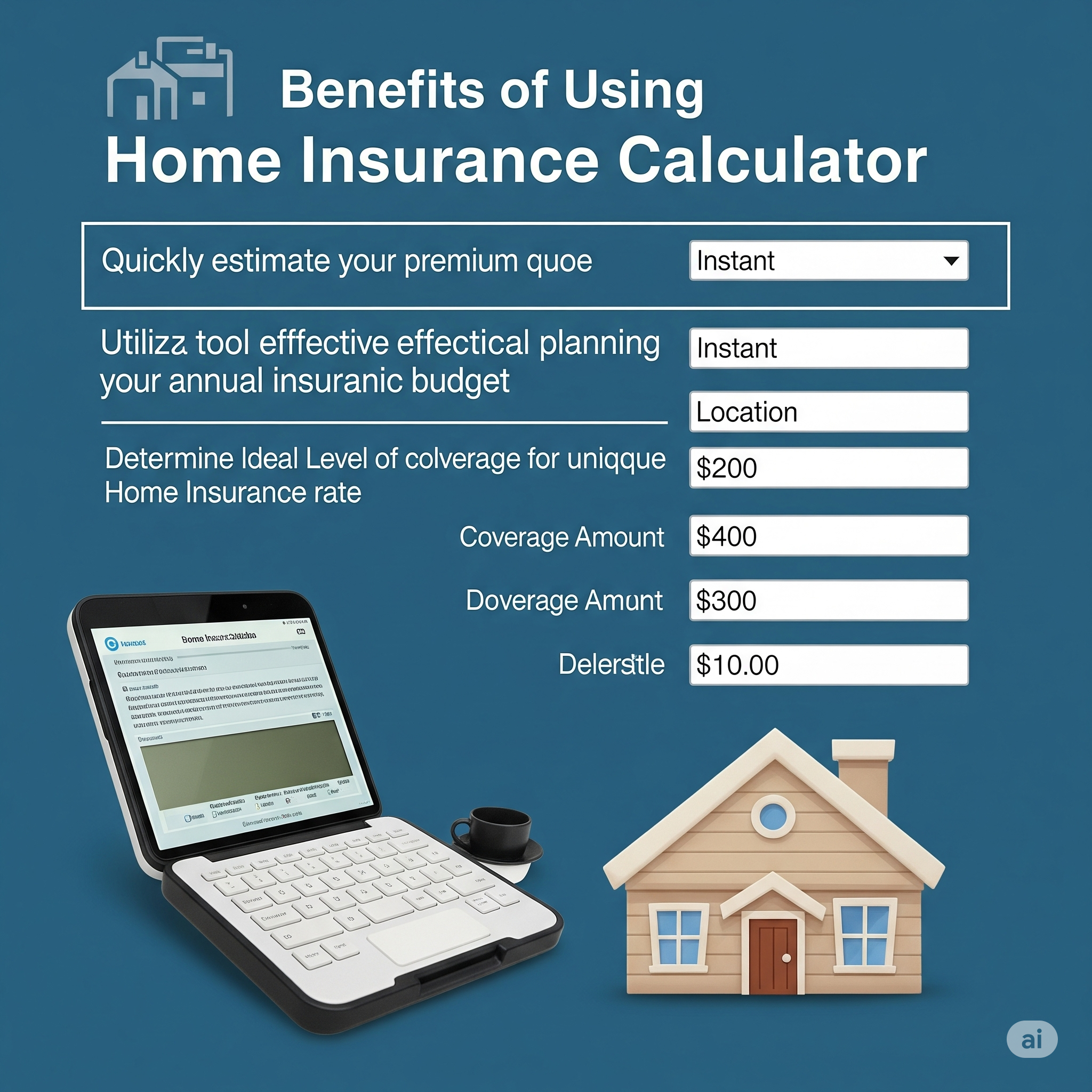Home Insurance Calculator: The Ultimate Guide to Estimating Your Coverage and Costs
Key Takeaways
- Home insurance calculators estimate your premiums based on your home’s features, location, and personal profile.
- Always use accurate data and consider rebuild cost, not just market value.
- Use multiple calculators for comparison shopping.
- Consider updating your calculations annually or after major home updates.
- While calculators offer strong estimates, final quotes may vary depending on the insurer.
Your home is likely one of the most valuable investments you’ll ever make. Protecting it with the right insurance coverage isn’t just wise—it’s essential. But how do you know how much coverage you need or what it might cost? This is where a home insurance calculator becomes invaluable. In this comprehensive guide, we’ll delve into everything you need to know about using a home insurance calculator, how it works, factors that affect your premium, and how to interpret your results.
Whether you’re a first-time homeowner, refinancing your mortgage, or simply reviewing your current policy, understanding how a home insurance calculator works will empower you to make informed decisions.
What is a Home Insurance Calculator?
A home insurance calculator is an online tool that helps you estimate the cost of insuring your property. It uses inputs like your home’s location, value, size, construction type, and other factors to generate an approximate insurance premium.
While the actual premium may differ slightly once an insurer evaluates your property in more detail, a calculator gives you a reliable ballpark figure, which is immensely helpful for budgeting and comparison shopping.
Benefits of Using a Home Insurance Calculator
- Quick Estimates: Get an instant idea of your premium.
- Comparison Shopping: Easily compare insurers.
- Financial Planning: Know what to budget for annually.
- Coverage Planning: Understand what kind of protection you need.
- Transparency: Reveals how various factors impact your rate.

How Does a Home Insurance Calculator Work?
Home insurance calculators are algorithm-based tools designed to assess risk and value. Here are the typical steps they follow:
Step 1: Collect Basic Information
- Property address
- Type of home (single-family, condo, townhouse, etc.)
- Year built
- Square footage
- Number of rooms
- Construction material (wood, brick, concrete)
Step 2: Evaluate Location-Based Risks
- Proximity to fire stations
- Crime rates in the area
- Natural disaster risks (floods, earthquakes, hurricanes)
Step 3: Assess Home Features
- Roof condition and type
- Plumbing and electrical systems
- Fireplaces or wood stoves
Step 4: Consider Personal Factors
- Credit score (varies by state)
- Claims history
- Occupancy type (owner-occupied, rental, vacant)
Step 5: Determine Coverage Needs
- Dwelling coverage (based on rebuild cost)
- Personal property coverage
- Liability coverage
- Additional living expenses

Types of Coverage Estimated by Home Insurance Calculators
1. Dwelling Coverage
This covers the structure of your home. It’s calculated based on rebuild cost, not market value.
2. Personal Property Coverage
Covers belongings like furniture, electronics, and clothing.
3. Liability Protection
Provides coverage if someone is injured on your property.
4. Additional Living Expenses (ALE)
Covers temporary housing if your home becomes uninhabitable due to a covered event.
5. Medical Payments
Covers minor medical bills for guests injured on your property.
Factors That Influence Your Estimate
1. Location
- High-risk zones increase premiums.
- Urban vs. rural differences.
2. Age and Condition of the Home
- Older homes can cost more to insure due to outdated systems.
3. Building Materials
- Brick homes often cost less to insure than wood-frame homes.
4. Credit Score
- A good credit score may reduce premiums.
5. Safety and Security Features
- Smoke alarms, security systems, and sprinkler systems can lower costs.
6. Claims History
- Fewer past claims = lower risk profile = cheaper insurance.
How to Use a Home Insurance Calculator Effectively
1. Gather Accurate Information
- Include all recent upgrades and renovations.
2. Understand Replacement Cost
- Don’t confuse it with market value.
3. Adjust Deductibles and Coverage
- Explore how changing your deductible impacts your premium.
4. Compare Multiple Tools
- Use calculators from various insurers and comparison websites.
5. Review Annually
- Recalculate after major life or property changes.
Advantages of Using an Online Calculator
- Convenience: Available 24/7.
- Speed: Instant results.
- Privacy: No need to speak with an agent.
- Education: Helps you understand what impacts your rate.
Best Home Insurance Calculators in 2025
1. Policygenius
- Great for side-by-side comparisons.
2. Lemonade
- Fast and AI-driven, ideal for tech-savvy users.
3. Allstate
- Offers customization and bundling options.
4. State Farm
- Trusted and detailed, good for families.
5. Progressive
- Excellent for multi-policy bundling.
Also Read : The Best Guide to Full Coverage Car Insurance
Conclusion
A home insurance calculator is an indispensable tool for any homeowner looking to get accurate, fast, and personalized insurance estimates. By understanding how these calculators work and what data they use, you can ensure that you’re making a well-informed decision regarding your home protection.
Whether you’re buying a new home or reassessing your current coverage, take advantage of home insurance calculators to save time, money, and headaches.
7 Frequently Asked Questions (FAQs)
1. Is a home insurance calculator accurate?
It provides a solid estimate but not a guaranteed quote. For exact pricing, speak to a licensed agent.
2. Do calculators account for natural disasters?
Most do, but only if they collect location-specific risk data.
3. Will using a calculator affect my credit score?
No. Calculators do not perform hard credit inquiries.
4. Can I get a quote directly from a calculator?
Some platforms offer direct quote options; others may connect you to agents.
5. How often should I use a home insurance calculator?
At least annually or after significant home improvements or lifestyle changes.
6. Do calculators work for rental properties?
Yes, but ensure you choose one that includes landlord-specific options.
7. Are calculators free to use?
Yes, reputable ones are always free.













